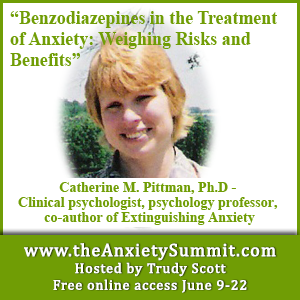
Yasmina Ykelenstam, the Low Histamine Chef, was interviewed by host of the Anxiety Summit, Trudy Scott, Food Mood Expert and Nutritionist, author of The Antianxiety Food Solution.
Histamine-containing Foods: their Role in Anxiety, Depression and Schizophrenia
- What is histamine
- Yasmina’s anxiety story and how she discovered the histamine connection
- How histamine can cause symptoms of anxiety: high-histamine foods, low levels of DAO or HMNT enzyme, neuroinflammation
- The histamine and depression/ schizophrenia connection and possible links to pyroluria
- Histamine disorders: allergies, histamine intolerance and mast cell activation
- The difficulty in diagnosing a histamine intolerance
- High histamine foods and factors that cause histamine to be released
- High histamine foods with anti-inflammatory properties
- How to eat when you have a histamine intolerance: the “histamine-balanced” diet
- Histamine interaction with psych medications such as valium and why this can be problematic for many doing the Ashton benzodiazepine taper protocol
- Histamine interaction with other medications and dyes in medications
Here are some snippets from our interview:
Histamine is the gluten of the intolerance world
Histamine is a neurotransmitter and plays a role in mood disorders
Here is one of the recent studies I mentioned: The human histaminergic system in neuropsychiatric disorders
The histaminergic system is involved in basic physiological functions, such as the sleep-wake cycle, energy and endocrine homeostasis, sensory and motor functions, cognition, and attention, which are all severely affected in neuropsychiatric disorders.
Here, we present recent postmortem findings on the alterations in this system in neuropsychiatric disorders, including Parkinson’s disease (PD), Alzheimer’s disease (AD), Huntington’s disease (HD), depression, and narcolepsy.
Histamine can cause symptoms of anxiety:
- Increased heart rate and blood pressure
- Shortness of breath and gasping for air
- Pounding heart
- Dizziness and feeling faint
Here is the complete list of Histamine Intolerance Symptoms on Yasmina’s blog
Yasmina’s blog is a wealth of information. Here is a post on The Histamine Mast Cell Depression link
According to a growing body of research, by Dr Theoharides and others, shows that pro-inflammatory brain cytokines are implicated in depression. In English: mast cells cause inflammation in the brain, which causes depression.
In short, neuroinflammation, involving mast cells, can manifest in many different ways. In some people it can cause disorders involving a loss of speech (autism) or psych disorders (schizophrenia, bipolar, major depression), or demyelination disorders like Multiple Sclerosis
We didn’t discuss this paper, but I’m sharing it because it’s the most recent study by Dr. Theoharides: Mast cells, brain inflammation and autism
brain MCs [mast cells] may be involved in the pathogenesis of “brain fog,” headaches, and autism spectrum disorders (ASDs), which worsen with stress
I did bring up “whole blood histamine” testing and the work of Dr. Carl Pfeiffer and Dr. William Walsh but we’ll have to take a deeper dive into this in a subsequent interview. You can read more about this here: Methylation and anxiety: histadelia and histapenia
We did also briefly talk about this in my interview with Dr Ben Lynch: How Methylfolate can make you Feel Worse and even Cause Anxiety, and What to do about it
Our discussion around the benzodiazapines was fascinating and very concerning:
Many people doing a benzo taper are often switched to Valium which is a DAO blocker and further prevents histamine from being removed from the body
Dye are also triggers…the pink Xanax can be problematic
In general I have real concerns with benzodiazapines being prescribed and you can check out my interview with Dr. Katherine Pittman on season 1 of the Anxiety Summit here: Benzodiazepines Risks vs Benefits
Be sure to get Yasmina’s ebook Taster of My High Nutrient Diet
If you are not already registered for the Anxiety Summit you can get live access to the speakers of the day here: www.theAnxietySummit.com
Missed this interview or can’t listen live? Or want this and the other great interviews for your learning library? Purchase the MP3s or MP3s + transcripts and listen when it suits you.
You can find your purchasing options here: Anxiety Summit Season 1, Anxiety Summit Season 2, and Anxiety Summit Season 3.

